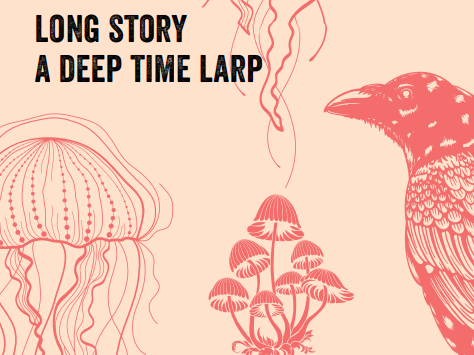Imagine stepping into a time-machine. We are on a journey through the history of planet Earth. The time-machine stops at set intervals, and you will be given the option to either continue the journey or resume your life on earth. But will you and your species flourish in the period you've chosen? How quickly will you be forced to evolve into something new and different? Will you have been a good ancestor for your successors?
 In the Collaboratory Playing with Deep Time, which ran from the summer of 2020 to the summer of 2021, Laura Op de Beke, invited people to engage with deep time and more-than-human relations through multiplayer, and even multi-species, collaborative storytelling.
In the Collaboratory Playing with Deep Time, which ran from the summer of 2020 to the summer of 2021, Laura Op de Beke, invited people to engage with deep time and more-than-human relations through multiplayer, and even multi-species, collaborative storytelling.
The scenario sketched out above is inspired by the LARP (live-action role-playing game) “Long Story: a deep time LARP” that Op de Beke wrote for the Collaboratory, and illustrates how Playing with Deep Time prompts emotional, ethical, and imaginative engagement with concepts such as evolution, extinction, and legacy. The ambition of the Collaboratory was to design encounters with deep time that evoked a sense of agency and responsibility instead of indifference. In addition to the LARP, the Collaborative used table-top games like Microscope to explore the feelings that emerge from seeing human history as entangled with earths’ history.
Op de Beke admits that a few players were confused by the LARP, but that it was generally well received. Some players had a strong emotional response to the play. Stepping out of the time-machine and committing to life on earth, also intrinsically means that you are committing yourself to extinction. Op de Beke describes being consious of deep time as a luxury, something that is more available if you have no or few other pressing concerns hanging over you. And yet, thinking in deep time makes the long-term effects of climate change and environmental degradation more apparent. Moreover, the practice of collaborative storytelling has the potential to reveal the different stakes and concerns people hold regarding the future, offering both the space and the tools to negotiate them. Finally, LARP can give a more embodied understanding of extinction and transformation, making room for perspectives that most people don’t have room for in their day-to-day life.
Although the Collaboratory is finished it continues to have an impact. In the fall of 2022, “Long Story: a deep time LARP” was nominated for IndieCade’s (Independent Festival of Independent Games) Live Action Award. If you want to try out LARP, Laura Op de Beke is co-organising Grenselandet this year. It is an international LARP festival in Oslo, where you can participate in short and intense LARPs from all over Europe December 9th and 10th.
